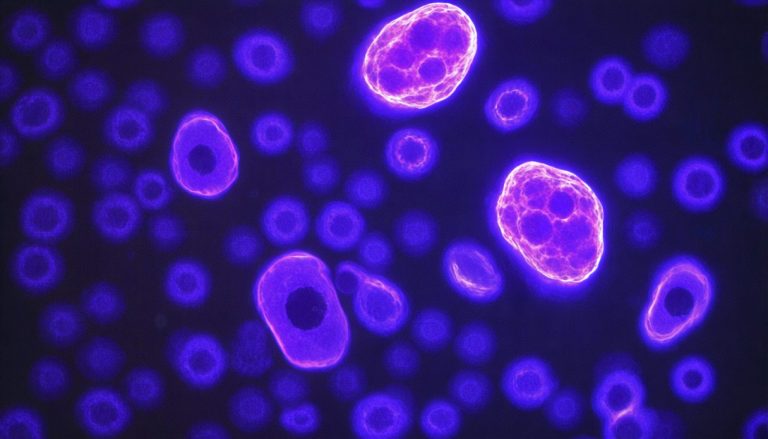
- Tahoe Therapeutics has launched Tahoe 100M, a groundbreaking dataset with 100 million single-cell data points across 50 cancer types, transforming research potential.
- The dataset enhances single-cell data accessibility by 50-fold, revealing cellular interactions with 1,100 drug treatments.
- The Mosaic Platform, led by co-founder Dr. Johnny Yu, enables large-scale, simultaneous drug testing with unprecedented resolution.
- Partnered with the Arc Institute, the open-source Arc Virtual Cell Atlas complements Tahoe 100M, aiding AI-driven cancer therapy innovations.
- Dr. Hani Goodarzi highlights the platform’s ability to mitigate batch effects, improving data comparison.
- The dataset powers AI models, aiding early cancer detection and personalized treatments, as noted by AI scientist Dr. Bo Wang with the scGPT model.
- Tahoe 100M fosters openness in research, likened to an “internet of biology,” unlocking collaborative breakthroughs in cancer treatment.
In the ever-evolving landscape of biomedical research, Tahoe Therapeutics has set a remarkable precedent. The company’s latest offering, Tahoe 100M, has sent ripples through the scientific community, sparking imaginative possibilities for the future of drug discovery. This expansive dataset, boasting 100 million single-cell data points and detailed through 60,000 experiments, offers a lens into the unseen cellular dynamics across 50 diverse cancer types.
Tahoe 100M ushers in a new era with its colossal repository, marking a 50-fold increase in accessible single-cell data globally. Imagine peering into a cellular universe where each cell’s genomic story unfolds with clarity, revealing how it interacts with 1,100 different drug treatments. These interactions form a vivid mosaic of cellular responses, crucial for understanding cancer’s multifaceted nature.
At the heart of this chronology is Tahoe’s intricate Mosaic Platform, a technological marvel that intricately weaves together complex cellular interactions with staggering precision. Dr. Johnny Yu, Tahoe’s visionary co-founder, championed this platform, equating it to constructing a personalized ‘mosaic tumor.’ This approach enables simultaneous, large-scale drug testing across various cancer types, thereby achieving an unparalleled resolution. The platform captures an impressive 20,000 measurements across all protein-coding genes per assay, offering an extraordinary depth of information that was previously unattainable.
Partnering with the Arc Institute, Tahoe has further amplified its mission by unveiling the Arc Virtual Cell Atlas, which complements this database as an open-source treasure trove for researchers worldwide. The ease of access, reflected by thousands of downloads on Hugging Face, underscores the dataset’s intrinsic value for AI-driven cancer therapy models. Dr. Hani Goodarzi, a key scientific co-founder, emphasizes how the Mosaic Platform mitigates batch effects, a common obstacle that renders single-cell data comparisons challenging.
As exciting as these advances are, they align with the broader potential of AI in transforming how we confront cancer. Unlike traditional approaches that often limited themselves to protein structures, Tahoe 100M embraces the complexity inherent in patient biology. Understanding these intricate networks is crucial; it shifts the paradigm towards ‘AI-first’ approaches, offering new hope for early cancer detection and treatment.
Renowned AI scientist Dr. Bo Wang highlights the dataset’s monumental role in training AI models to discern nuanced cellular responses. His team’s groundbreaking model, scGPT, represents the frontier of adapting AI to biological data, with Tahoe 100M enriching these efforts. By facilitating a deeper understanding of dosage-dependent responses, Tahoe 100M empowers scientists to develop predictive models for patient stratification, thereby personalizing treatment strategies.
The release of Tahoe 100M may well be a catalyst for igniting an ethos of openness in scientific investigation, echoing the ambition of crafting an “internet of biology”. By unshackling powerful data from behind proprietary walls, Tahoe has set the stage for a transformative collaboration in biomedical research, where the complex tapestry of cellular interactions meets revolutionary AI insights head-on. Through this paradigm, the future of cancer treatment holds vast, untapped potential, promising breakthroughs that could redefine human health.
Revolutionizing Cancer Research: How Tahoe 100M Is Changing the Game
Introduction
In the rapidly advancing field of biomedical research, Tahoe Therapeutics has launched a groundbreaking initiative that could significantly alter cancer treatment paradigms. The introduction of their extensive dataset, Tahoe 100M, is a catalyst for transformation, producing substantial insights into the cellular mechanics of over 50 cancer types.
Tahoe 100M: Unveiling the Dataset
Tahoe 100M boasts an extraordinary 100 million single-cell data points, acquired through 60,000 extensive experiments. It opens new dimensions in cellular biology by providing a detailed map of cellular behavior in response to 1,100 different drug treatments, offering a 50-fold increase in accessible single-cell data worldwide.
Key Features and Benefits
– Comprehensive Cellular Interactions: Detailed examination of how individual cancer cells interact with various treatments.
– Mosaic Platform: Facilitates large-scale drug testing with precision, capturing 20,000 measurements across all protein-coding genes per assay.
– Integration with Arc Virtual Cell Atlas: Open-source access for global researchers, boosting AI-enhanced cancer therapy modeling.
Leveraging AI in Cancer Treatment
The dataset empowers AI models to detect intricate cellular responses, an asset for personalized medicine. The integration with models like scGPT enables:
– Nuanced Insights: AI can now decipher cellular responses to drug regimens, helping tailor personalized treatment strategies.
– Predictive Modeling: Understanding dosage-dependent responses allows for more accurate predictions regarding patient stratification.
Potential Applications and Market Trends
– Early Detection and Treatment: Shifts the paradigm towards earlier and more accurate cancer detection by focusing on cellular interactions rather than mere protein structures.
– AI-First Approaches: Encourages the development of AI-driven platforms for personalized treatments.
– Collaborative Research: Promotes an “internet of biology”, fostering openness and shared insights in scientific research.
Controversies and Limitations
While the potential is significant, challenges remain:
– Data Privacy: Ensuring patient data remains confidential is critical.
– Resource Intensive: Requires significant computational power for analysis, which could be a limiting factor for some institutions.
Actionable Tips
1. Incorporate AI: Researchers should consider integration of AI tools to leverage the Tahoe 100M dataset fully.
2. Collaborate Openly: Engage with international teams to share insights and findings.
3. Focus on Personalization: Analyze cellular interactions to develop tailored treatment protocols.
Conclusion
The deployment of Tahoe 100M represents not merely a step but a leap forward in cancer research, pushing boundaries in both AI models and personalized healthcare. Tahoe Therapeutics’ initiative fosters an ethos of openness and collaboration, potentially heralding breakthroughs that could redefine the future landscape of cancer treatment and human health. As biomedical research continues to evolve, embracing these innovations is essential for harnessing their full potential.
Consider exploring further at Tahoe Therapeutics for more detailed insights and updates.



